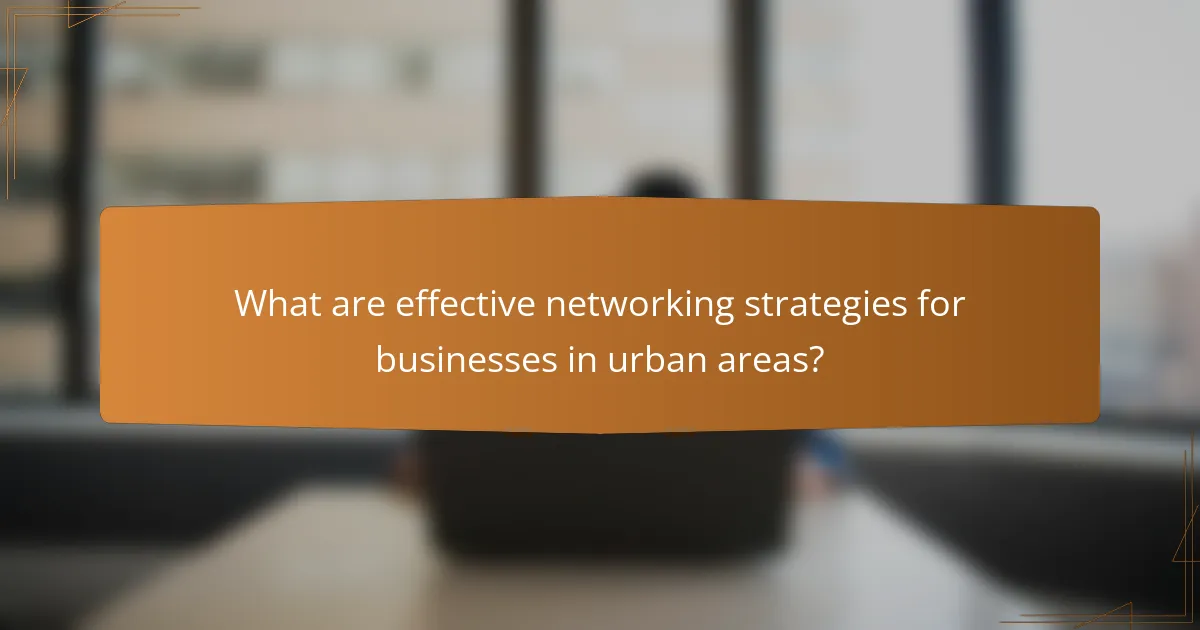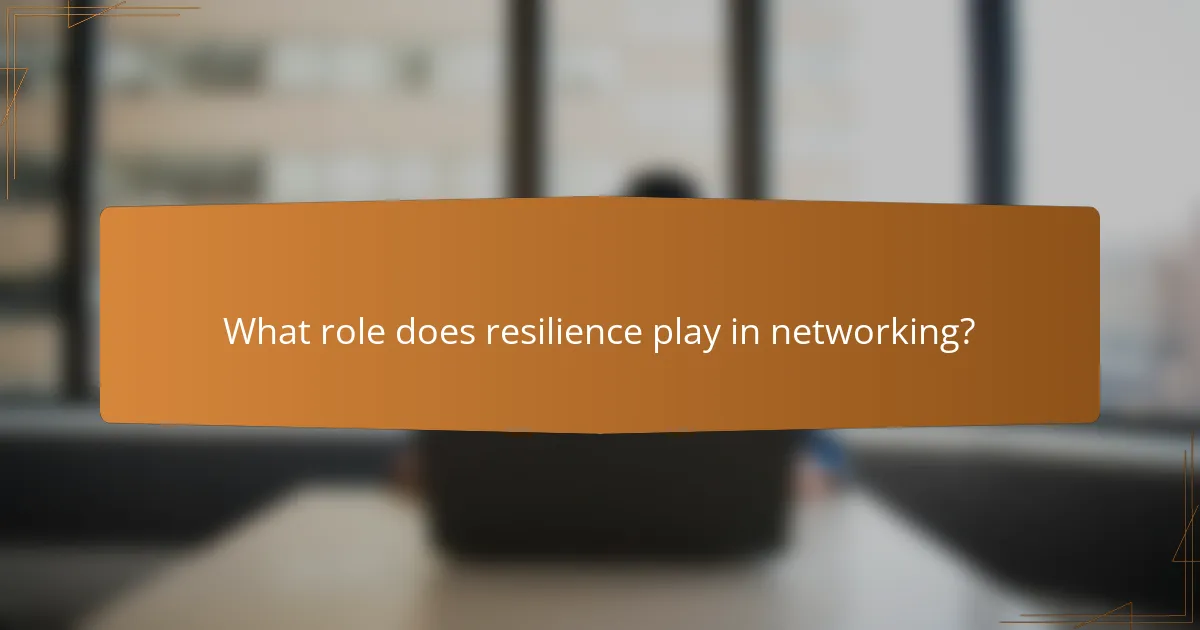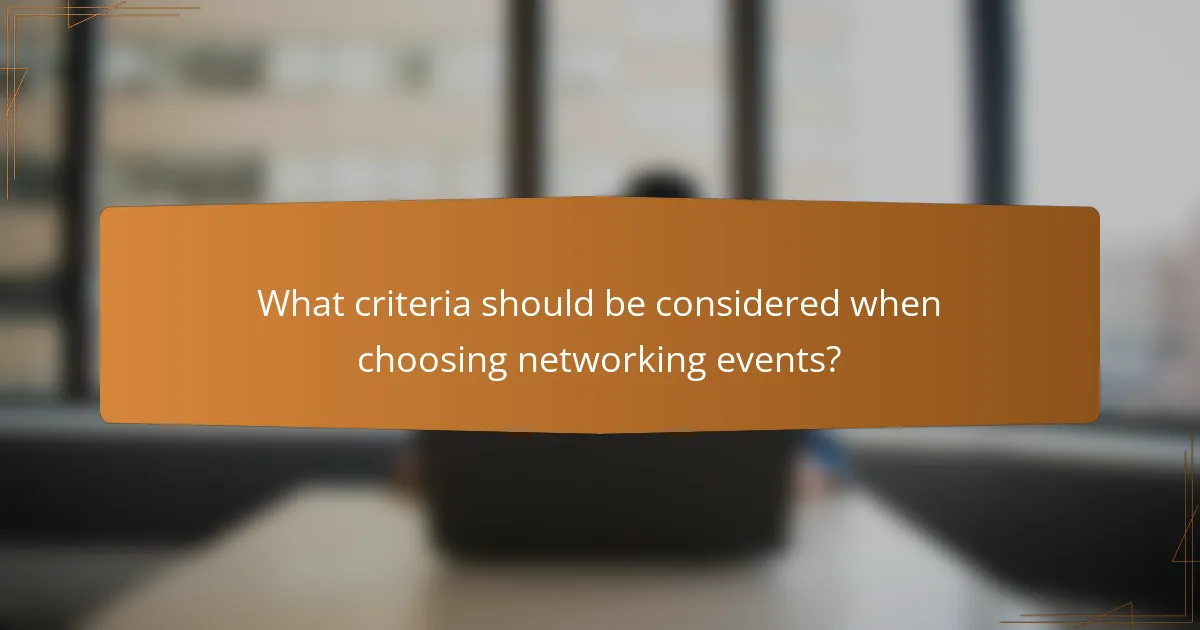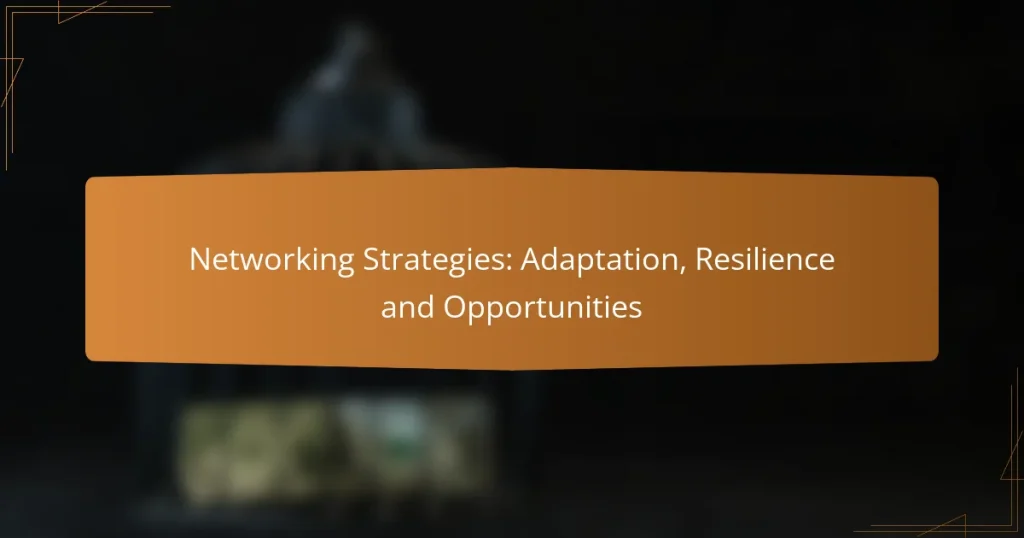In today’s dynamic business landscape, effective networking strategies are essential for fostering connections and seizing opportunities. By adapting to changing environments and demonstrating resilience in the face of challenges, individuals and organizations can build valuable relationships that enhance visibility and drive success. Leveraging both local engagement and digital platforms allows for a more robust networking approach, ensuring that businesses remain connected and responsive to emerging trends.

What are effective networking strategies for businesses in urban areas?
Effective networking strategies for businesses in urban areas focus on building connections through local engagement and digital platforms. By leveraging community resources and technology, businesses can enhance their visibility and foster valuable relationships.
Leveraging local business events
Attending local business events, such as trade shows, conferences, and networking meetups, is crucial for urban businesses. These gatherings provide opportunities to meet potential clients, partners, and industry leaders face-to-face.
Consider participating in events hosted by local chambers of commerce or industry associations. Prepare an elevator pitch and bring business cards to maximize your networking efforts.
Utilizing social media platforms
Social media platforms like LinkedIn, Facebook, and Instagram are essential tools for urban businesses to connect with their audience. Regularly sharing content relevant to your industry can attract followers and foster engagement.
Join local groups on these platforms to participate in discussions and showcase your expertise. Engaging with posts from other businesses can also help build relationships and expand your network.
Joining industry-specific organizations
Becoming a member of industry-specific organizations can provide access to exclusive networking opportunities and resources. These groups often host events, workshops, and seminars tailored to your sector.
Membership can also enhance credibility and visibility within your industry. Look for organizations that align with your business goals and values to ensure a good fit.
Participating in community initiatives
Engaging in community initiatives can strengthen your business’s reputation and build local connections. Volunteer for local charities, sponsor events, or collaborate with other businesses on community projects.
These activities not only enhance your visibility but also demonstrate your commitment to the community, fostering goodwill and potential partnerships.
Building partnerships with local influencers
Collaborating with local influencers can amplify your business’s reach and credibility. Identify influencers in your area who align with your brand values and have a strong following in your target market.
Consider co-hosting events, creating joint content, or offering exclusive promotions through these partnerships. This strategy can enhance your visibility and attract new customers effectively.

How can adaptation enhance networking success?
Adaptation enhances networking success by allowing individuals and organizations to respond effectively to changing environments and opportunities. By being flexible and open to new strategies, one can build stronger connections and leverage emerging trends for better outcomes.
Embracing digital communication tools
Utilizing digital communication tools is essential for modern networking. Platforms like LinkedIn, Zoom, and Slack facilitate connections across geographical boundaries, enabling real-time interaction and collaboration.
Consider using a mix of video calls, messaging apps, and social media to engage with contacts. This approach not only broadens your reach but also caters to varying preferences among your network.
Adjusting to market trends
Staying informed about market trends is crucial for effective networking. By understanding shifts in your industry, you can identify potential partners and opportunities that align with current demands.
Regularly review industry reports and news articles to spot emerging trends. Attend webinars or conferences to gain insights and connect with like-minded professionals who share your interests.
Personalizing outreach efforts
Personalizing outreach efforts significantly increases the chances of successful networking. Tailoring your messages to reflect the recipient’s interests or needs shows genuine engagement and can foster stronger relationships.
Use specific details about your contacts when reaching out, such as referencing a recent project or shared connection. This personal touch can make your communication stand out and encourage a positive response.

What role does resilience play in networking?
Resilience in networking is crucial as it enables individuals to navigate challenges and maintain connections despite obstacles. It involves adapting to setbacks and leveraging experiences to foster stronger relationships and opportunities.
Overcoming rejection and setbacks
Rejection is a common experience in networking, but resilience helps you bounce back. Instead of viewing rejection as a failure, consider it an opportunity to learn and refine your approach. Analyze what went wrong and adjust your strategy for future interactions.
For instance, if a potential contact does not respond, follow up after a reasonable period. A polite reminder can demonstrate your persistence and willingness to engage. Remember, many successful professionals faced numerous rejections before achieving their goals.
Maintaining long-term relationships
Building and sustaining long-term relationships requires consistent effort and resilience. Regular check-ins, sharing relevant resources, or simply expressing appreciation can keep connections strong. Aim to provide value to your network, which fosters mutual support.
Consider setting reminders to reach out to key contacts periodically. This proactive approach ensures you remain on their radar and reinforces your commitment to the relationship. A simple message or a coffee invitation can go a long way in maintaining rapport.
Staying consistent in outreach
Consistency in outreach is vital for effective networking. Establish a routine for connecting with new contacts and nurturing existing ones. This could involve dedicating specific times each week to send emails or engage on professional platforms like LinkedIn.
Utilize tools like calendars or task management apps to track your outreach efforts. Aim for a balance between quantity and quality; reaching out to a handful of well-chosen contacts each week can be more beneficial than mass messaging. Remember, persistence is key in building a robust network.

What opportunities arise from effective networking?
Effective networking opens doors to various opportunities, including access to new markets, collaboration on projects, and increased visibility within your industry. These benefits can significantly enhance your professional growth and business prospects.
Access to new markets
Networking can provide valuable insights into new markets that may not be readily accessible through traditional channels. By connecting with industry peers and influencers, you can learn about emerging trends and customer needs in different regions.
Consider attending industry conferences or local meetups to build relationships with individuals who have experience in markets you wish to enter. This can lead to partnerships or referrals that facilitate market entry.
Collaboration on projects
Building a strong network allows for collaboration on projects that can enhance innovation and efficiency. By leveraging the skills and expertise of your contacts, you can tackle larger or more complex projects than you could alone.
Look for opportunities to co-create with others in your network, whether through joint ventures, shared resources, or knowledge exchange. This collaborative approach can lead to better outcomes and shared success.
Increased visibility in the industry
Effective networking enhances your visibility in your industry, making it easier for others to recognize your expertise and contributions. Engaging with peers through social media, industry forums, or speaking engagements can elevate your profile.
To maximize your visibility, actively participate in discussions, share valuable content, and attend industry events. Consistent engagement can position you as a thought leader and attract new opportunities.

What criteria should be considered when choosing networking events?
When selecting networking events, consider factors such as industry relevance, lead generation potential, and location accessibility. These criteria help ensure that your time and resources are effectively utilized to build meaningful connections.
Relevance to industry
Choosing events that are relevant to your industry is crucial for maximizing networking opportunities. Look for gatherings that attract professionals from your field, as this increases the likelihood of meeting potential collaborators or clients.
Research the event’s agenda and speaker lineup to ensure they align with your interests and goals. For example, a technology conference featuring leading experts can provide insights and connections that are directly applicable to your work.
Potential for lead generation
Evaluate the potential for lead generation at networking events by assessing the attendee demographics and the types of businesses represented. Events that attract decision-makers or influencers in your sector can significantly enhance your chances of generating valuable leads.
Consider attending events that offer structured networking sessions, such as speed networking or roundtable discussions, which can facilitate more focused interactions. Aim for events where attendees are actively seeking partnerships or services similar to what you offer.
Location and accessibility
The location and accessibility of networking events play a vital role in your decision-making process. Choose events that are easy to reach, whether they are local or require minimal travel, to ensure you can attend without significant hassle.
Consider the venue’s amenities, such as parking availability and public transport options. Additionally, virtual events have become increasingly popular, providing flexibility for those unable to travel. Weigh the pros and cons of in-person versus online networking based on your personal circumstances and preferences.


